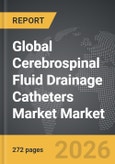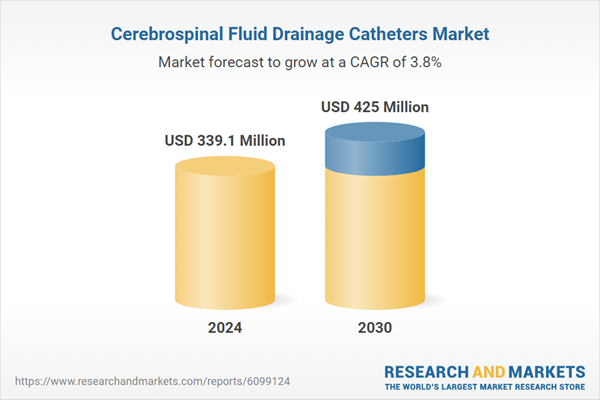Global Cerebrospinal Fluid Drainage Catheters Market - Key Trends & Drivers Summarized
Why Are Cerebrospinal Fluid Drainage Catheters Essential in Managing Intracranial Pressure and Neurological Complications?
Cerebrospinal fluid (CSF) drainage catheters play a critical role in neurosurgical and intensive care settings by enabling controlled diversion of CSF to manage elevated intracranial pressure (ICP), hydrocephalus, subarachnoid hemorrhage, traumatic brain injury (TBI), and post-operative complications. These catheters - commonly inserted via lumbar or ventricular access - serve both diagnostic and therapeutic purposes, facilitating pressure monitoring, infection prevention, and CSF sampling in patients at risk of neurological deterioration.As neurocritical care becomes increasingly standardized, the use of external ventricular drains (EVDs) and lumbar drainage systems has become foundational in protocols aimed at preventing cerebral herniation, reducing edema, and improving patient outcomes in high-acuity neurotrauma and neurosurgery scenarios. Their utility in managing CSF leaks and cerebrospinal infections further expands their role in complex neurological care.
How Are Design Innovations and Infection Control Strategies Enhancing CSF Drainage Catheter Performance?
Product development is focused on improving catheter biocompatibility, precision flow regulation, and infection resistance. Advanced catheter systems now feature antimicrobial coatings (e.g., silver-impregnated or antibiotic-eluting materials), closed-valve systems to reduce contamination risk, and integrated pressure sensors to facilitate real-time ICP monitoring. These innovations are addressing complications such as catheter-associated infections (e.g., ventriculitis), occlusion, and over-drainage, which have historically limited long-term safety and clinical adoption.Automated drainage systems and programmable valves are gaining traction for their ability to deliver consistent, adjustable CSF outflow tailored to patient-specific ICP targets. Additionally, transparent tubing, kink-resistant materials, and enhanced securing mechanisms are improving placement stability and ease of management, particularly in pediatric, trauma, and long-term ICU settings.
Where Is Demand for CSF Drainage Catheters Expanding and Which Clinical Applications Are Driving Utilization?
North America and Europe represent mature markets with high utilization in neurosurgery centers, trauma ICUs, and academic hospitals. The U.S. remains a key adopter, supported by advanced neurocritical care infrastructure, high procedure volumes, and widespread adherence to clinical guidelines for ICP management. Europe follows closely, with regional demand bolstered by structured trauma systems and rising surgical volumes in neuro-oncology and hydrocephalus treatment.Asia-Pacific is an emerging high-growth region, with increased awareness of neurocritical care protocols and expanding access to neurosurgical services in India, China, and Southeast Asia. Key applications driving use include traumatic brain injury management, aneurysmal subarachnoid hemorrhage treatment, intracranial hemorrhage stabilization, tumor resection post-op care, and congenital hydrocephalus interventions. Pediatric neurology and neuro-oncology centers represent growing use cases, particularly for lumbar and programmable catheter systems.
What Is Fueling the Global Growth of the Cerebrospinal Fluid Drainage Catheters Market?
The global CSF drainage catheters market is expanding due to the increasing incidence of neurocritical conditions, rising surgical interventions involving the central nervous system, and the growing emphasis on intracranial pressure monitoring as a standard of care. Technological advancements, improved infection control protocols, and favorable clinical outcomes are enhancing clinician confidence and broadening use across care settings.Ongoing innovation in catheter design, combined with multidisciplinary care models in neurosurgery and critical care, is supporting more efficient, safe, and patient-specific CSF management. As global healthcare systems invest in neurocritical infrastructure and minimally invasive neurosurgical techniques, a key question shapes future growth: Can cerebrospinal fluid drainage catheter technologies evolve to offer superior infection control, precision, and long-term reliability - while supporting scalable neurocare delivery across both advanced and resource-constrained clinical environments?
Report Scope
The report analyzes the Cerebrospinal Fluid Drainage Catheters market, presented in terms of market value (US$). The analysis covers the key segments and geographic regions outlined below:- Segments: Type (Lumbar Drainage Catheter, Ventricular Drainage Catheter); Application (Traumatic Brain Injury, Traumatic Spinal Injury, Subarachnoid Hemorrhage, Intracerebral Hemorrhage, Other Applications).
- Geographic Regions/Countries: World; United States; Canada; Japan; China; Europe (France; Germany; Italy; United Kingdom; Spain; Russia; and Rest of Europe); Asia-Pacific (Australia; India; South Korea; and Rest of Asia-Pacific); Latin America (Argentina; Brazil; Mexico; and Rest of Latin America); Middle East (Iran; Israel; Saudi Arabia; United Arab Emirates; and Rest of Middle East); and Africa.
Key Insights:
- Market Growth: Understand the significant growth trajectory of the Lumbar Drainage Catheter segment, which is expected to reach US$287.1 Million by 2030 with a CAGR of a 3.2%. The Ventricular Drainage Catheter segment is also set to grow at 5.3% CAGR over the analysis period.
- Regional Analysis: Gain insights into the U.S. market, valued at $92.4 Million in 2024, and China, forecasted to grow at an impressive 7% CAGR to reach $85.3 Million by 2030. Discover growth trends in other key regions, including Japan, Canada, Germany, and the Asia-Pacific.
Why You Should Buy This Report:
- Detailed Market Analysis: Access a thorough analysis of the Global Cerebrospinal Fluid Drainage Catheters Market, covering all major geographic regions and market segments.
- Competitive Insights: Get an overview of the competitive landscape, including the market presence of major players across different geographies.
- Future Trends and Drivers: Understand the key trends and drivers shaping the future of the Global Cerebrospinal Fluid Drainage Catheters Market.
- Actionable Insights: Benefit from actionable insights that can help you identify new revenue opportunities and make strategic business decisions.
Key Questions Answered:
- How is the Global Cerebrospinal Fluid Drainage Catheters Market expected to evolve by 2030?
- What are the main drivers and restraints affecting the market?
- Which market segments will grow the most over the forecast period?
- How will market shares for different regions and segments change by 2030?
- Who are the leading players in the market, and what are their prospects?
Report Features:
- Comprehensive Market Data: Independent analysis of annual sales and market forecasts in US$ Million from 2024 to 2030.
- In-Depth Regional Analysis: Detailed insights into key markets, including the U.S., China, Japan, Canada, Europe, Asia-Pacific, Latin America, Middle East, and Africa.
- Company Profiles: Coverage of players such as AbbVie Inc., Allergan plc, Anavex Life Sciences Corp., AstraZeneca plc, Biogen Inc. and more.
- Complimentary Updates: Receive free report updates for one year to keep you informed of the latest market developments.
Some of the 32 companies featured in this Cerebrospinal Fluid Drainage Catheters market report include:
- B. Braun Melsungen AG
- Codman & Shurtleff (J&J)
- Desu Medical
- Dispomedica GmbH
- G. Surgiwear Ltd.
- Integra LifeSciences Corporation
- Johnson & Johnson Medical Devices
- Medtronic plc
- MIETHKE (Christoph Miethke GmbH)
- Möller Medical GmbH
- Natus Medical Incorporated
- NuVasive Inc.
- Smith & Nephew plc
- Sophysa SA
- Spiegelberg GmbH & Co. KG
- Stryker Corporation
- Tuoren Medical
- Wellong Instruments Co., Ltd.
- Yushin Medical Co., Ltd.
- Zimmer Biomet Holdings, Inc.
This edition integrates the latest global trade and economic shifts into comprehensive market analysis. Key updates include:
- Tariff and Trade Impact: Insights into global tariff negotiations across 180+ countries, with analysis of supply chain turbulence, sourcing disruptions, and geographic realignment. Special focus on 2025 as a pivotal year for trade tensions, including updated perspectives on the Trump-era tariffs.
- Adjusted Forecasts and Analytics: Revised global and regional market forecasts through 2030, incorporating tariff effects, economic uncertainty, and structural changes in globalization. Includes historical analysis from 2015 to 2023.
- Strategic Market Dynamics: Evaluation of revised market prospects, regional outlooks, and key economic indicators such as population and urbanization trends.
- Innovation & Technology Trends: Latest developments in product and process innovation, emerging technologies, and key industry drivers shaping the competitive landscape.
- Competitive Intelligence: Updated global market share estimates for 2025, competitive positioning of major players (Strong/Active/Niche/Trivial), and refined focus on leading global brands and core players.
- Expert Insight & Commentary: Strategic analysis from economists, trade experts, and domain specialists to contextualize market shifts and identify emerging opportunities.
Table of Contents
Companies Mentioned (Partial List)
A selection of companies mentioned in this report includes, but is not limited to:
- B. Braun Melsungen AG
- Codman & Shurtleff (J&J)
- Desu Medical
- Dispomedica GmbH
- G. Surgiwear Ltd.
- Integra LifeSciences Corporation
- Johnson & Johnson Medical Devices
- Medtronic plc
- MIETHKE (Christoph Miethke GmbH)
- Möller Medical GmbH
- Natus Medical Incorporated
- NuVasive Inc.
- Smith & Nephew plc
- Sophysa SA
- Spiegelberg GmbH & Co. KG
- Stryker Corporation
- Tuoren Medical
- Wellong Instruments Co., Ltd.
- Yushin Medical Co., Ltd.
- Zimmer Biomet Holdings, Inc.
Table Information
| Report Attribute | Details |
|---|---|
| No. of Pages | 272 |
| Published | February 2026 |
| Forecast Period | 2024 - 2030 |
| Estimated Market Value ( USD | $ 339.1 Million |
| Forecasted Market Value ( USD | $ 425 Million |
| Compound Annual Growth Rate | 3.8% |
| Regions Covered | Global |









